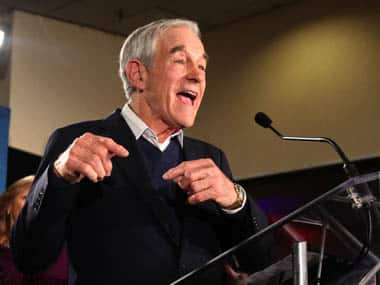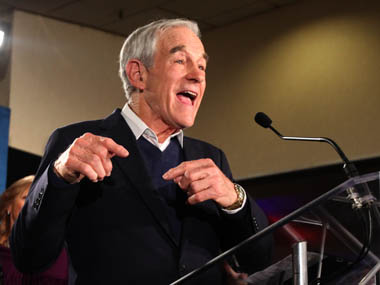Everybody has a batty old uncle in ill-fitting clothes who goes on and on about why we should all learn to live within our means or else we’ll all go down the tube. It’s a fair bet that ear muffs and earbud speakers were invented just to silence the ceaseless drone of the elderly relative who is so firm in his belief he hasn’t altered his avuncular advice in over 25 years. America today has just such a batty uncle in Ron Paul, the Republican presidential candidate whose monotonous monologues on the virtue of thrift and prudence it had managed successfully to blot out for over a generation of heady, go-go capitalism and adrenaline-driven wars overseas. Today, after a decade and more of wars, and after three-plus years of a housing bubble that went bust, dragged down the financial system and eroded national wealth, greater than ever numbers of Americans are waking up to the economic principles — and the alternative worldview — of the man they had dismissed for so long as a cuckoo. [caption id=“attachment_179434” align=“alignleft” width=“380” caption=“Republican presidential candidate Ron Paul speaks to supporters at his New Hampshire primary night rally in Manchester. Reuters”]
 [/caption] After 25-plus years of being on message, Paul, the unlikely messiah who finished an unexpected third in the Iowa Republican caucus and second in the New Hampshire primary, has finally found his flock. Curiously for a man in his 70s, whose ill-fitting suits set him so visibly apart from the flashy and much younger pack of Republican candidates, Paul’s following is predominantly made up of young voters. That support comes at the intersection of many political and economic ideas, not all of which may appeal to all his supporters. In some cases, Paul’s libertarian political philosophy, which emphasises maximalist personal liberty free of government ‘interference’, has also become a magnet for supporters with views –
on race, for instance
- that he finds
embarrassing and has disavowed
. Even if Paul’s rise in recent weeks proves fleeting, just the fact that a man with such radical views on politics and the economy has found any traction at all in the Republican Party, which had long sold its soul to neoconservatives, says much about a slice of America. The fact that Paul has not pandered to the Republican base on some “red meat” issues, but goes farther than most other Republicans, points to the contradictions he embodies. Many of Paul’s supporters, for instance, are drawn to him for his radical “anti-war” message, which directly challenges the neo-conservative narrative that has overtaken the Republican party in recent years. After more than a decade of waging unwinnable wars in Iraq and Afghanistan, and the enormous loss of human lives and trillions of dollars, middle-class America is weary of war. And Ron Paul’s message - bring home the troops, end war profiteering by the military-industrial complex, shut down overseas military bases, and invest in reviving the US economy – appeals to them. But what marks Paul out as intellectually honest is that this isn’t a political position he has adopted to match the mood of the moment. In the years after the 9/11 terror attack, he went against the tide of popular opinion, particularly among conservatives, and voted against Bush-Cheney war-mongering. But it’s also the reason why Paul is criticised by core conservatives and even middle-of-the-road commentators as an “isolationist” who would enfeeble America.
Columnist Richard Cohen notes
: “Paul opposes just about all international treaties and organizations. He would have the United States pull out of the United Nations and NATO. He would do away with foreign aid, abolish the CIA and essentially turn his back on the rest of the world. This is pretty much what used to be called isolationism, and it allowed Hitler to presume, quite correctly as it turned out, that America would not interfere with his plans to conquer Europe, Britain included. It took Germany’s declaration of war on the United States, not the other way round, to get Uncle Sam involved.” Today, for instance, Paul is the only Republican candidate who opposes any US military action against Iran, even if it acquired nuclear weapons. The money spent on the Iraq and Afghan wars have, if anything, made America more unsafe, he argues. In any case, he says, the US has no business being a global policeman; it should limit itself to ensuring that its homeland is secure, and should focus instead on reviving its economy. Paul’s critique of US economic policy dates back to the time when the US went off the gold standard. Cheap money policy, he argues, has debased the US dollar and transferred wealth, through inflation, from the middle class to the rich. He was among those who
warned as early as in 2003
, that the housing bubble would burst and impoverish the overleveraged middle class. He frequently
lectures US Federal Reserve Chairman Ben Bernanke
on the folly of ultra-loose monetary policy, and on the merits of the Austrian school of economics, as opposed to Keynesian economics. If Paul had his way, he would fire the Federal Reserve Board and restore the US to the gold standard, which would compel it to live within its means. But, again, his doctrinaire economic approach, while sound on theory, has invited criticism from economists who argue that spending cuts of the size he contemplates in the time-frame he recommends would cause the US economy to fall off a cliff. Paul’s cutbacks on entitlements,
they point out
, would “destroy the social safety net… Your kids would be out of school, working or begging.” Paul’s chances of securing the Republican nomination – or of becoming President – are only better than that of a snowflake in hell. But just the fact that a man with such an “unRepublican” worldview has made it thus far into the Republican primary race is showing up the prevailing mood among a slice of America today.
[/caption] After 25-plus years of being on message, Paul, the unlikely messiah who finished an unexpected third in the Iowa Republican caucus and second in the New Hampshire primary, has finally found his flock. Curiously for a man in his 70s, whose ill-fitting suits set him so visibly apart from the flashy and much younger pack of Republican candidates, Paul’s following is predominantly made up of young voters. That support comes at the intersection of many political and economic ideas, not all of which may appeal to all his supporters. In some cases, Paul’s libertarian political philosophy, which emphasises maximalist personal liberty free of government ‘interference’, has also become a magnet for supporters with views –
on race, for instance
- that he finds
embarrassing and has disavowed
. Even if Paul’s rise in recent weeks proves fleeting, just the fact that a man with such radical views on politics and the economy has found any traction at all in the Republican Party, which had long sold its soul to neoconservatives, says much about a slice of America. The fact that Paul has not pandered to the Republican base on some “red meat” issues, but goes farther than most other Republicans, points to the contradictions he embodies. Many of Paul’s supporters, for instance, are drawn to him for his radical “anti-war” message, which directly challenges the neo-conservative narrative that has overtaken the Republican party in recent years. After more than a decade of waging unwinnable wars in Iraq and Afghanistan, and the enormous loss of human lives and trillions of dollars, middle-class America is weary of war. And Ron Paul’s message - bring home the troops, end war profiteering by the military-industrial complex, shut down overseas military bases, and invest in reviving the US economy – appeals to them. But what marks Paul out as intellectually honest is that this isn’t a political position he has adopted to match the mood of the moment. In the years after the 9/11 terror attack, he went against the tide of popular opinion, particularly among conservatives, and voted against Bush-Cheney war-mongering. But it’s also the reason why Paul is criticised by core conservatives and even middle-of-the-road commentators as an “isolationist” who would enfeeble America.
Columnist Richard Cohen notes
: “Paul opposes just about all international treaties and organizations. He would have the United States pull out of the United Nations and NATO. He would do away with foreign aid, abolish the CIA and essentially turn his back on the rest of the world. This is pretty much what used to be called isolationism, and it allowed Hitler to presume, quite correctly as it turned out, that America would not interfere with his plans to conquer Europe, Britain included. It took Germany’s declaration of war on the United States, not the other way round, to get Uncle Sam involved.” Today, for instance, Paul is the only Republican candidate who opposes any US military action against Iran, even if it acquired nuclear weapons. The money spent on the Iraq and Afghan wars have, if anything, made America more unsafe, he argues. In any case, he says, the US has no business being a global policeman; it should limit itself to ensuring that its homeland is secure, and should focus instead on reviving its economy. Paul’s critique of US economic policy dates back to the time when the US went off the gold standard. Cheap money policy, he argues, has debased the US dollar and transferred wealth, through inflation, from the middle class to the rich. He was among those who
warned as early as in 2003
, that the housing bubble would burst and impoverish the overleveraged middle class. He frequently
lectures US Federal Reserve Chairman Ben Bernanke
on the folly of ultra-loose monetary policy, and on the merits of the Austrian school of economics, as opposed to Keynesian economics. If Paul had his way, he would fire the Federal Reserve Board and restore the US to the gold standard, which would compel it to live within its means. But, again, his doctrinaire economic approach, while sound on theory, has invited criticism from economists who argue that spending cuts of the size he contemplates in the time-frame he recommends would cause the US economy to fall off a cliff. Paul’s cutbacks on entitlements,
they point out
, would “destroy the social safety net… Your kids would be out of school, working or begging.” Paul’s chances of securing the Republican nomination – or of becoming President – are only better than that of a snowflake in hell. But just the fact that a man with such an “unRepublican” worldview has made it thus far into the Republican primary race is showing up the prevailing mood among a slice of America today.
Venky Vembu attained his first Fifteen Minutes of Fame in 1984, on the threshold of his career, when paparazzi pictures of him with Maneka Gandhi were splashed in the world media under the mischievous tag ‘International Affairs’. But that’s a story he’s saving up for his memoirs… Over 25 years, Venky worked in The Indian Express, Frontline newsmagazine, Outlook Money and DNA, before joining FirstPost ahead of its launch. Additionally, he has been published, at various times, in, among other publications, The Times of India, Hindustan Times, Outlook, and Outlook Traveller.
)